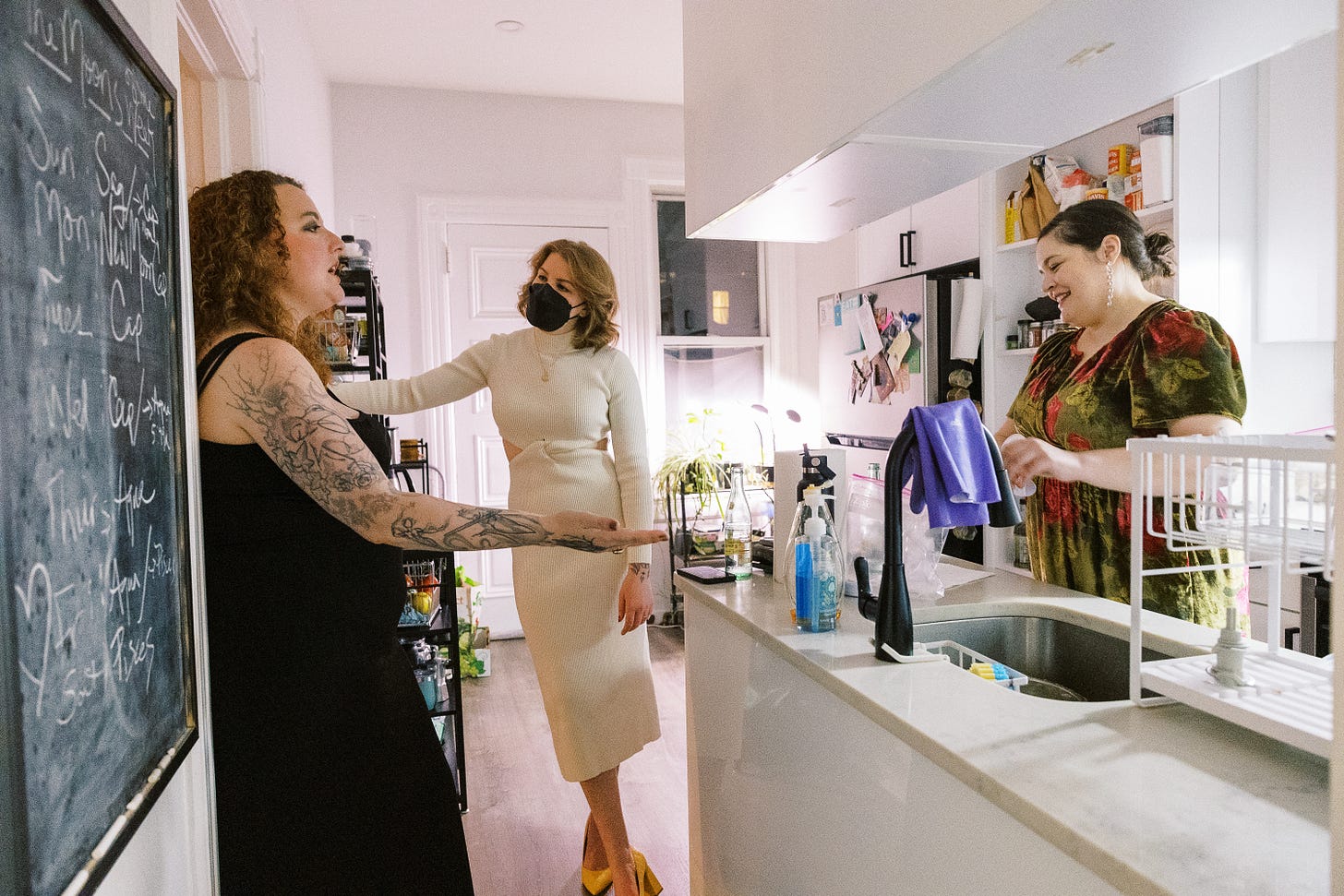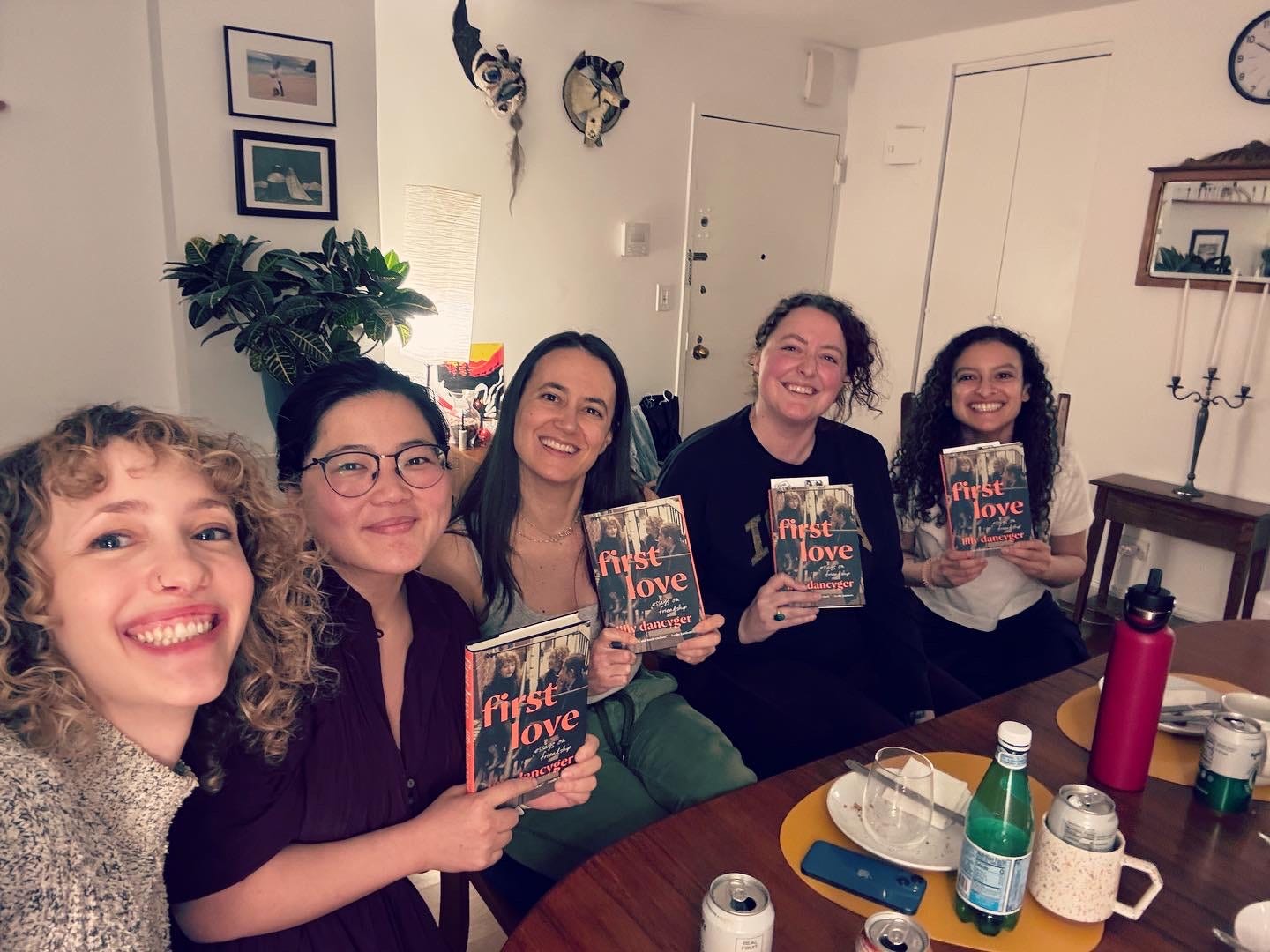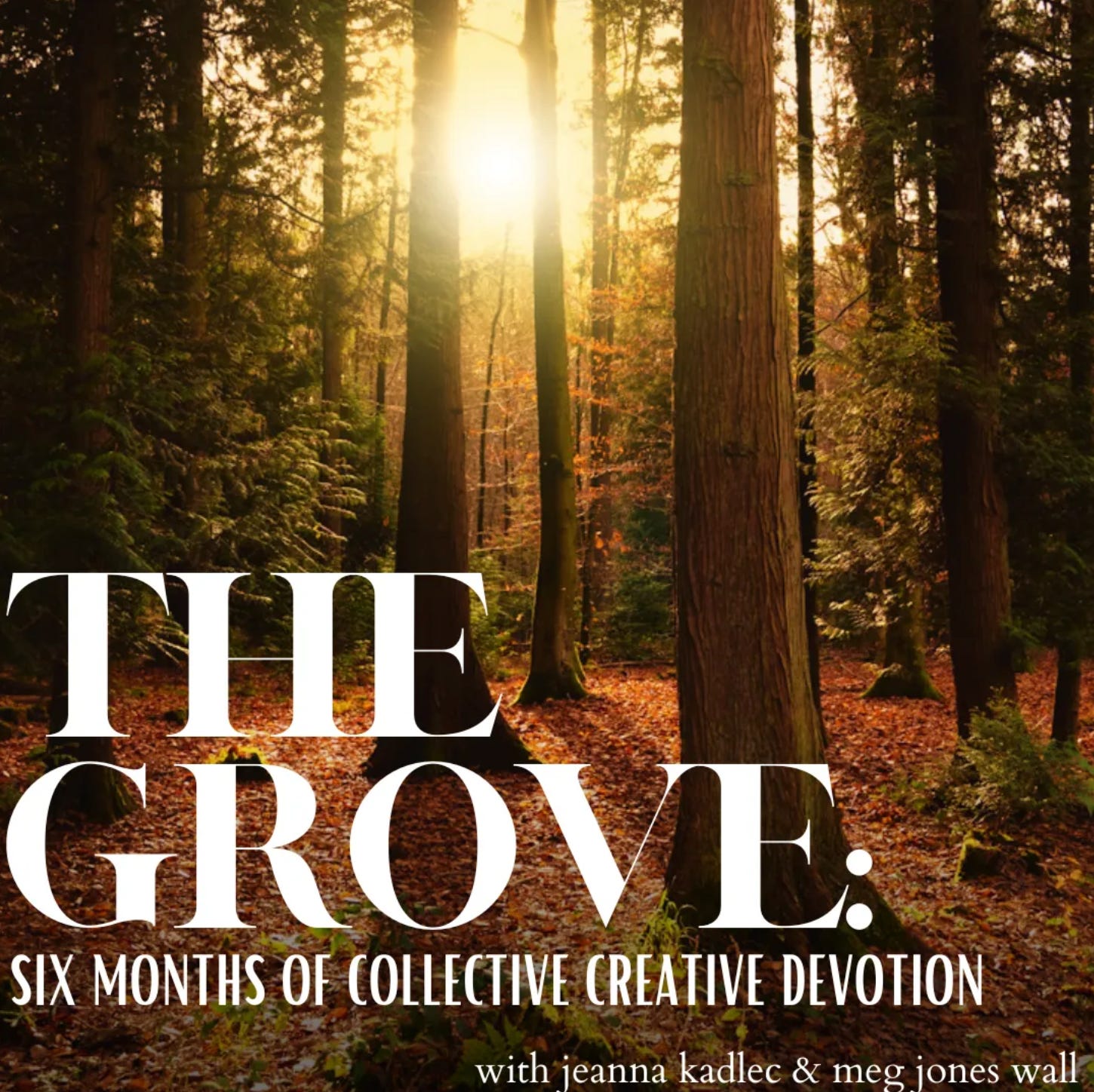on the full moon in aquarius & cultivating community
Before we get into the Full Moon, some quick announcements:
ICYMI
🔮 If the astrological correspondences to the tarot have never worked for you: yeah, me either. That’s why my wife Meg Jones Wall and I have spent years developing our own correspondences, which we are now sharing in an exploratory lecture, Stars & Cards, at readers’ request.

The Full Moon arrives at 16* Aquarius at 3:55am Eastern on Saturday, August 9th.
And I’ve been thinking a lot about that Aquarian idea of community: what it is, and what it isn’t.
Community has become a kind of buzzword. It is posited as the antidote to fascism, and I agree, with the caveat that community — the showing up, the mutual aid, the bringing your neighbors groceries or helping cover an out-of-work friend’s bills — is antithetical to an individualist, white supremacist-trained mindset. Community is rarely convenient.
To orient to a collective is different than to want friends. Let me say that again. Wanting a community is different than wanting friends.
Wanting friends is good! Craving like-minded, like-hearted, similarly-nerdy folks you can connect with is good! Vital, even! Friendship is philia, that most revered of the Greek loves: the relationships and bonds we choose.
This may feel extra sticky if you, like me, have cultivated friends who you count as chosen family and community. Queers are particularly primed for this, especially those of us who are estranged from our natal families. Cut off from blood family and straight society — which puts a marriage relationship at the top of the relational pecking order — many queers understand that finding a new community (or chosen family) is vital to surviving. Finding people you can trust and count on to “do life with,” as they said in the churches I grew up in, can feel like an obstacle course that you’re figuring out in real time.
To me, “friends” and “community” remain distinct. It’s the difference between the friend it’s fun to party with, or who you’ve known since high school and have the occasional catch-up with, and the neighbor you call to watch your kids during an emergency, or the friend who comes over to clean your house while you’re in the hospital (Marisol, I love you forever). It’s the difference between friends who “can’t handle” your current life troubles versus the concerned internet stranger following your saga who would like to send you money for takeout so you don’t have to cook in the midst of crisis or grief. It’s the difference between that one friend who reads your chapters when they have time versus your writers’ group who will consistently prioritize time to read.
Community does not necessarily indicate a particular closeness, but it does indicate a particular kind of commitment.
All relationships have their place. It’s just that community requires a particular kind of effort and stamina. Community is not just a fun catch-up call or night out — it is also listening to the new volunteer at the co-op talk about their relationship problems, or listen to that one person in your book club go on and on about a book you hated. It’s showing up for the greater purpose even when you’d rather skip that shift with that person, or not go to their house for an event.
Community is not always convenient.
Community means that sometimes we are annoyed by others. Sometimes we may think, of a class or container or book club meeting or social gathering, “well I wouldn’t do it that way.” But the point of a community is that the collective is greater than the sum of its parts. The point of a community is that it serves all of us, not just some of us. The point of doing community is that “give and take” are not always equal, but that it’s always in the service of something more.
Community is about committing to the collective in spite of the discomfort that comes from the friction that inevitably arises when different people occupy a shared space for a duration of time.
An example: my writers’ group. After eight years together, I love them all dearly, but we are also not best friends, and many of us were strangers to each other when we joined the group. We still don’t hang out a ton outside of group. This may surprise people who see the duration of our commitment and assume an intimacy in daily life. But what we have built is a creative community, founded on creative and professional development. No question is too basic, no complaint too petty for our group chat. For writing and career issues, they are my first call — before my sister, before my best friend, who can validate me but not advise me. Sometimes, we text all day, helping to trouble-shoot someone’s editorial problem. And sometimes, the chat is silent for a week — but there is still the trust that, when we need to call on each other for creative purposes, it will be there.

Over the years, my writers’ group has also had frank, honest, sometimes uncomfortable conversations as different people needed different levels of engagement, or where different members’ expectations of what the group would be were at odds. Our group has only stayed connected for this long because we have, each and every one of us, opted in when it would have been so easy to opt out, or just not pick up meeting again. We have been willing to shapeshift our little collective together, to move through the discomfort of scheduling conflicts, personality clashes, and our own diverse artistic needs, bonded in this moment by a greater shared purpose and desire and also by our profound creative trust. (Also also also you should subscribe to ’s wonderful newsletter and also buy everyone’s books, which are all on this list here — Deena ElGenaidi’s excellent debut comes out soon and pre-orders would be amazing!)
Community is not always convenient — but the result. Oh, the result. I would not be where I am in my career without those four women, without their advice, their edits, their challenges to my point of view, without the gentle pressure of all of us having WIPs, and perhaps, most of all, without them keeping me grounded when publishing as an industry made me feel insane.
Friction is essential to growth. And this Aquarius Full Moon embraces the friction — and the fruits on the other side.
Aquarius is the structure of the group: the structure of thought, the foundational beliefs. But Aquarius is also known for being contrarian, for being the one who is willing to speak truth, to maintain a boundary, that may well make others uncomfortable.
Aquarius does not let “perfect” be the enemy of done. Aquarius rejects the idea that there is “one right way” (itself, thinking rooted in white supremacist Christian hegemony). Aquarius invites us into the collective, into the forum, into the town square.
Aquarius also reminds us that guardrails are helpful when bringing so many disparate people together. Recently, I was speaking with someone about how blunt New Yorkers are, and I said, “Well, we have to be, don’t we? New York is full of so many people from so many walks of life from all over the world. Subtlety doesn’t work on a wide scale here. You have to say the obvious, blunt thing in order to clearly communicate your meaning.”
Bluntness does not always have a place in friendship, but it absolutely does have a place in community. This often takes the form of (Saturnian, aka Aquarius’ ruler!) rules and boundaries, which are vital in spaces that bring strangers together. An outline of shared values, of a code of conduct, are essential. We humans are social creatures, and we want to know how to behave in a space. Just think of any party you’ve gone to that was badly hosted — where the host didn’t introduce solo attendees to other guests and offer points of connection, where there wasn’t a house tour and you had to stumble through rooms to figure out where the kitchen and bathroom were. Gentle guidance in such circumstances is, actually, a gift — whether you’re at a party or in a Discord.
Hosting and group facilitation are two skills my wife and I share — ones that help us build community wherever we are. While I would never solely attribute particular skills to a singular slice of the sky, it’s notable that my Ascendant and Meg’s Midheaven are both in Aquarius. We also grew up active in our respective churches, and honestly, years of leading Bible studies sure has helped each of us develop high comfort levels with facilitation. We each run uber-active Discord servers, and The Grove: 6 Months of Collective Creative Devotion is very much an outgrowth of our desire to cultivate community (the next cohort starts August 29th!).
Here in New York, our house is the de facto gathering point for multiple friend groups. We host multiple D&D games and other assorted gatherings a month; a number of our close friends call our house their “second home.” Our space is “good” for hosting, but that was on purpose: we intentionally sought a space where we could be the gathering place (and wow, did Spirit deliver — we don’t have a dishwasher or laundry, but we sure do have a dining room, which is an unthinkable luxury at this price point in this city). We looked for this space. We did spells for this space. We asked Spirit to bring us the infrastructure for the community-oriented life we try to live.
And this is the thing: Community does not happen by accident. It is created through intention and through consistent investment. We do it, and then we wake up and do it again tomorrow.
This Full Moon, I invite you to reflect on the communities in your life — IRL and otherwise.
Why did you seek them out? What role do they play in your life? How do you invest, or “give,” to your communities? What do you get out of them?
This Full Moon is the culmination of the New Moon in Aquarius on January 28th earlier this year — which happened to be the newsletter’s sixth birthday. What communities have you invested in throughout the year so far? Where would you like to devote more time?
How have you been intentional in seeking/developing community in the past? What skills do you have that uniquely contribute to community development? (eg are you the scheduler, the encourager, the one who always “goes first,” etc.)
The Grove: 6 Months of Collective Creative Devotion, which I run with my wife Meg Jones Wall of 3am.tarot, is re-opening for an Autumn/Winter session! This next cohort will focus on connecting with creative and spiritual practices that are reflective of the post-harvest season here in the Northern Hemisphere. Our monthly themes will be:
September 2025/Month 1: Harvest / Distribution & Assessment
October 2025/Month 2: Farmer’s Market / Comparison & Competition
November 2025/Month 3: Rot & Compost
December 2025/Month 4: Communal Exchange & Holiday
January 2026/Month 5: The Dark Midwinter
February 2026/Month 6: Slow Waking
The Grove meets live several times a month and includes a number of asynchronous supports and opportunities for connection, primarily through a dedicated Discord. The community that has sprung up out of our first cohort is so special, and we hope that like-hearted writers and artists will join us! Here’s what one member of the first Grove had to say about her experience:
When The Grove was first announced, it felt to me like a lifeline. I joined with the intention of creating new art for a show I wanted to have this year. I had to set my work aside several months before when my dad’s cancer diagnosis changed, and I didn’t have the capacity to focus on this project I so badly wanted to bring to life.
Having a space like The Grove to help me stay focused and grounded in creativity and spiritual connection sounded like just what I needed to be able to get back to my art. What I didn’t know, was that participating in this community would send me on a side quest away from what I thought I needed to be doing. Through the conversations during monthly kickoff calls and within the Discord community, I realized that I had some other work to do before I could get back to my art. I leaned into grief work through tarot (thanks to Meg’s amazing spreads), and dug deeper into my chart (thanks to Jeanna’s brilliant astrology conversations). I started to learn watercolor for the joy of it. And I shared what I was exploring through all of it within the community.
My dad died a couple months into The Grove, and I know without a doubt that being in this community helped me stay connected to my heart and hope during a very difficult time. And I also know that because I went on that side quest, I was able to begin to build a solid connection to my spiritual and creative practices that do not have to be tied to “work.”
And also, I was eventually able to make new art for a show because I had built up practices that supported me in making the art my heart needed. So grateful to this community for supporting this creative wildling through these past months!
— Marika
We hope you’ll join us!
Thank you for reading this edition of Astrology for Writers. I appreciate you!


I think the piece about having history in religious community is real. Whatever issues I may have with the faith I grew up in (they are myriad, trust me), they sure taught me how to be in community with all sorts of folks I would never have chosen as friends, appreciating everyone’s gifts and eccentricities. Or at least letting go of frustration ultimately, because the big why of coming together mattered more. I think it’s harder in secular community to find that level of commitment and patience with the irritations and (honestly) boredom of so much community building.
I love this distinction between friends and community. It gives me a lot to think about. Sometimes I wonder if I expect this commitment you define as innate to community, of my friends, and perhaps that's not fair!